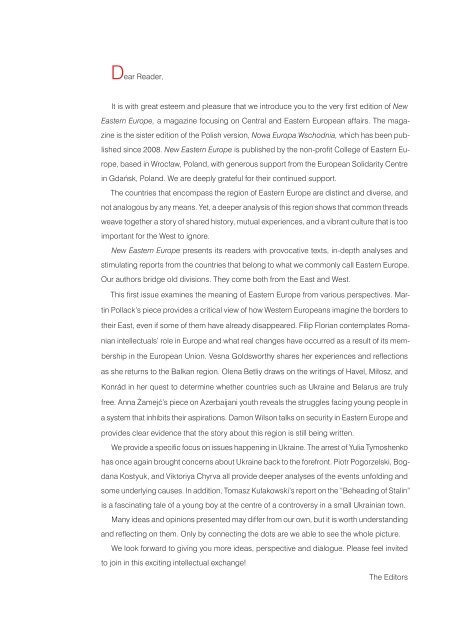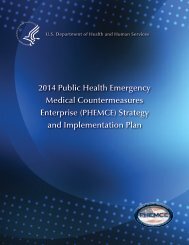Create successful ePaper yourself
Turn your PDF publications into a flip-book with our unique Google optimized e-Paper software.
Dear Reader,<br />
It is with great esteem and pleasure that we introduce you to the very fi rst edition of <strong>New</strong><br />
<strong>Eastern</strong> <strong>Europe</strong>, a magazine focusing on Central and <strong>Eastern</strong> <strong>Europe</strong>an affairs. The magazine<br />
is the sister edition of the Polish version, Nowa Europa Wschodnia, which has been published<br />
since 2008. <strong>New</strong> <strong>Eastern</strong> <strong>Europe</strong> is published by the non-profi t College of <strong>Eastern</strong> <strong>Europe</strong>,<br />
based in Wrocław, Poland, with generous support from the <strong>Europe</strong>an Solidarity Centre<br />
in Gdańsk, Poland. We are deeply grateful for their continued support.<br />
The countries that encompass the region of <strong>Eastern</strong> <strong>Europe</strong> are distinct and diverse, and<br />
not analogous by any means. Yet, a deeper analysis of this region shows that common threads<br />
weave together a story of shared history, mutual experiences, and a vibrant culture that is too<br />
important for the West to ignore.<br />
<strong>New</strong> <strong>Eastern</strong> <strong>Europe</strong> presents its readers with provocative texts, in-depth analyses and<br />
stimulating reports from the countries that belong to what we commonly call <strong>Eastern</strong> <strong>Europe</strong>.<br />
Our authors bridge old divisions. They come both from the East and West.<br />
This fi rst issue examines the meaning of <strong>Eastern</strong> <strong>Europe</strong> from various perspectives. Mar-<br />
tin Pollack’s piece provides a critical view of how Western <strong>Europe</strong>ans imagine the borders to<br />
their East, even if some of them have already disappeared. Filip Florian contemplates Roma-<br />
nian intellectuals’ role in <strong>Europe</strong> and what real changes have occurred as a result of its mem-<br />
bership in the <strong>Europe</strong>an Union. Vesna Goldsworthy shares her experiences and refl ections<br />
as she returns to the Balkan region. Olena Betliy draws on the writings of Havel, Miłosz, and<br />
Konrád in her quest to determine whether countries such as Ukraine and Belarus are truly<br />
free. Anna Żamejć’s piece on Azerbaij ani youth reveals the struggles facing young people in<br />
a system that inhibits their aspirations. Damon Wilson talks on security in <strong>Eastern</strong> <strong>Europe</strong> and<br />
provides clear evidence that the story about this region is still being written.<br />
We provide a specifi c focus on issues happening in Ukraine. The arrest of Yulia Tymoshenko<br />
has once again brought concerns about Ukraine back to the forefront. Piotr Pogorzelski, Bog-<br />
dana Kostyuk, and Viktoriya Chyrva all provide deeper analyses of the events unfolding and<br />
some underlying causes. In addition, Tomasz Kułakowski’s report on the “Beheading of Stalin”<br />
is a fascinating tale of a young boy at the centre of a controversy in a small Ukrainian town.<br />
Many ideas and opinions presented may differ from our own, but it is worth understanding<br />
and refl ecting on them. Only by connecting the dots are we able to see the whole picture.<br />
We look forward to giving you more ideas, perspective and dialogue. Please feel invited<br />
to join in this exciting intellectual exchange!<br />
The Editors



